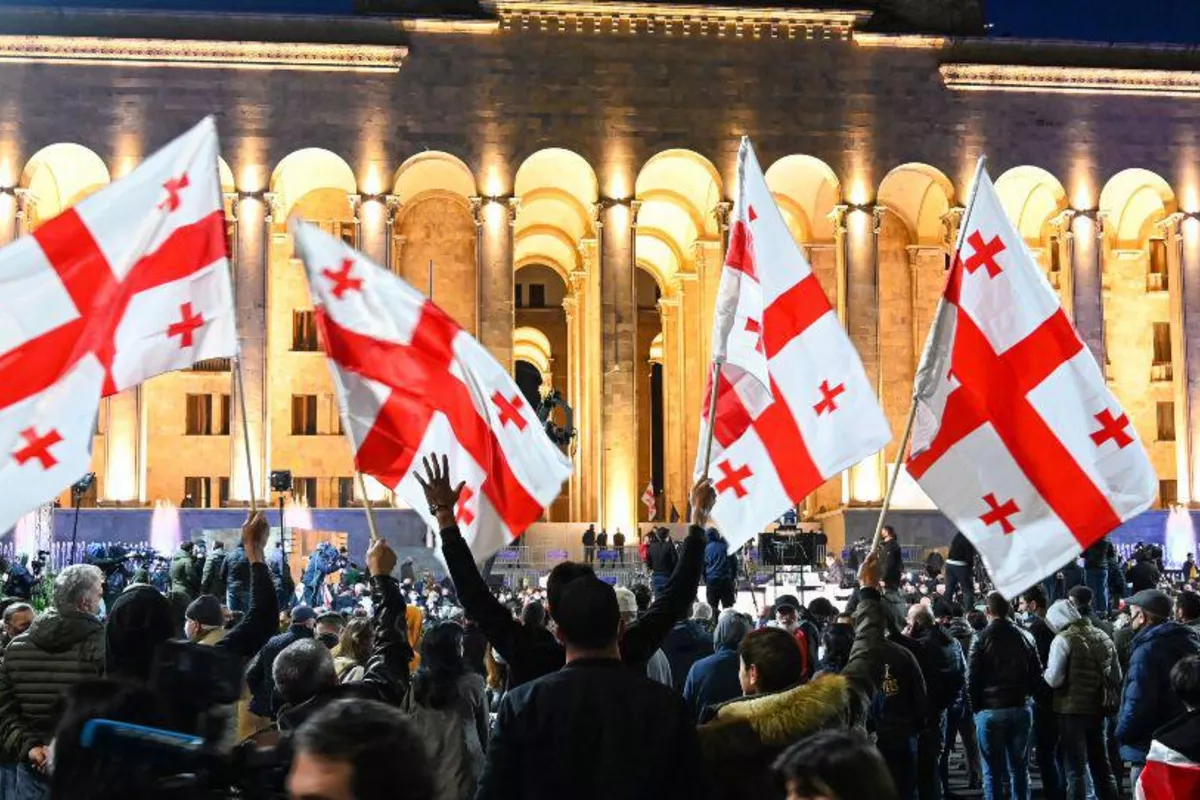
Getty images
In Georgia, pressure is no longer an abstraction - it’s a diagram etched into the heartbeat of the nation. When the country enters a period of storms, it becomes all the more important to hear the voice of sober analysis behind the loud slogans and street noise - a voice capable of distinguishing growing pains from provocation, reform from political theater, and a geopolitical game from a national choice.
In an interview with The Caspian Post, Gocha Tsopurashvili - a political analyst and Doctor of Economic Sciences - shares his insights from the intersection of two worlds: numbers and meaning, reform and identity. As Deputy Chairman of the Commission on Agrarian Innovations of the Georgian Academy of Agricultural Sciences, he is one of the rare experts who skillfully bridges geopolitics with the deeper logic of sustainable development. He understands that behind every law lies not only bureaucracy, but the fate of a country - its farmers, its institutions.
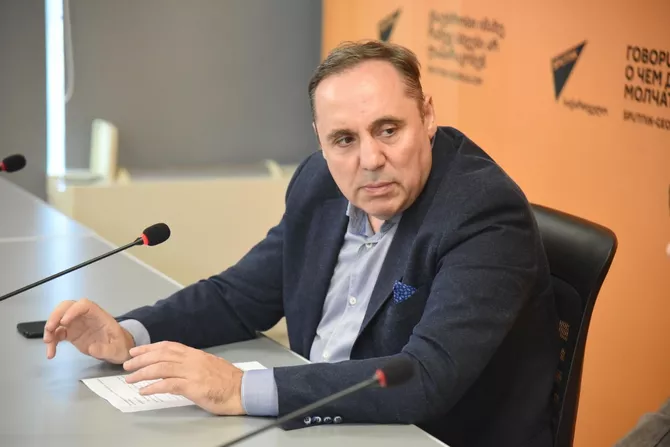
Why has Georgia now chosen full transparency, even at the cost of irritating Brussels? How can the “foreign influence law” be interpreted not as fear of civil society, but as an attempt to restore state sovereignty? Who has the right to define freedom - external actors or the electorate that has chosen the path of sovereign development?
This is not a conversation filled with political clichés - it is a dialogue with someone who has journeyed from municipal governance to analyzing national strategy. Gocha Tsopurashvili is not afraid to call things by their names and poses the fundamental question of our time: Can a small country with a great past remain true to itself in an era of foreign scripts?
- Four revolution attempts in four years - would you agree that this is not just statistics but a pressure chart? Why was it crucial for Georgia to embrace full transparency now, even at the cost of displeasing Brussels?
- Let’s begin with the fact that since 2020, the West has been expecting Georgia to gradually transition toward a coalition government, with key positions going to pro-Western, mostly liberal forces - predominantly figures from the old Saakashvili-era guard. The assumption was that the ruling “Georgian Dream” party would eventually step aside, and a coalition model would mark a systemic shift in political direction.
However, time has shown that betting on politicians who have long lost the public’s trust was a strategic miscalculation. Despite their presence in parliament, the opposition failed to force early elections. On the contrary, it became increasingly evident each year that external and internal pressure - whether through NGOs, media, or street protests - was not delivering the desired outcome.
Today, the opposition is again calling for a “revolutionary scenario.” One of the UNM leaders, Levan Khabeishvili, openly states that the only remaining path is to forcibly overthrow the government. This is a direct admission of political deadlock.
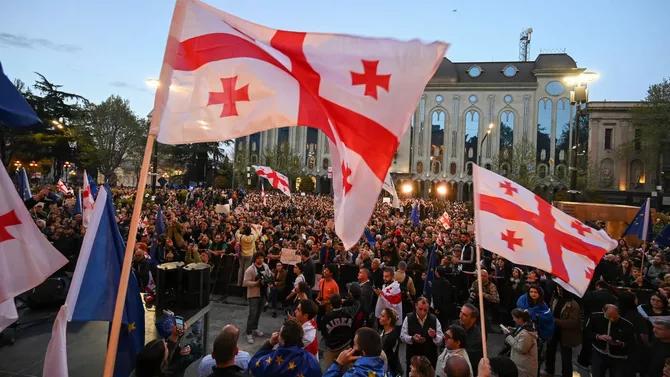
Vano Shlamov/AFP/Getty Images
Meanwhile, “Georgian Dream” has shifted tactics: it is now on the offensive, actively exposing crimes of the previous regime, relying on witness testimony, and launching public investigations. The goal is clear - to discredit opponents and preserve domestic stability.
This has brought renewed attention to the influence of Western structures. A vast NGO network, a significant portion of youth involved in their projects - all of this has formed a parallel power structure the government has long struggled to manage. Now, however, the authorities are trying to convince society that externally imposed scenarios are dangerous and could drag the country into destructive processes, including the risk of armed conflict.
Despite criticism from the EU - including figures such as Josep Borrell and Pawel Herczynski - the government remains firm. The foreign influence law is just one element of this course. And while it provokes irritation in Brussels, Tbilisi is convinced: concessions would mean losing power and abandoning the sovereign path of development.
Paradoxically, it is precisely Georgian Dream’s resolve that allows it to maintain political balance amid external pressure and internal polarization. The country now faces a choice: continue its course of gradual national development, or once again be swept into the whirlpool of foreign interests.
- Can the new transparency law be seen not as a restriction on freedom, but as a vaccine against foreign interference? How does Georgian Dream plan to convince society that this is not about fearing civil society but about the courage to take responsibility for the country?
- When we discuss the new law, it’s important not only to analyze its legal nature but also to clearly communicate one key idea to the public: this law is necessary. It’s not a whim or political maneuver - it’s a requirement dictated by the very logic of national development.
Speaking from personal experience, I recall a situation a decade ago when I served as Deputy Minister of Agriculture, overseeing strategy, analytics, and policy. My task was to integrate all parts of the sector into one synchronized system - including NGOs, whose activities needed to align with development goals, rather than follow their own parallel agendas.
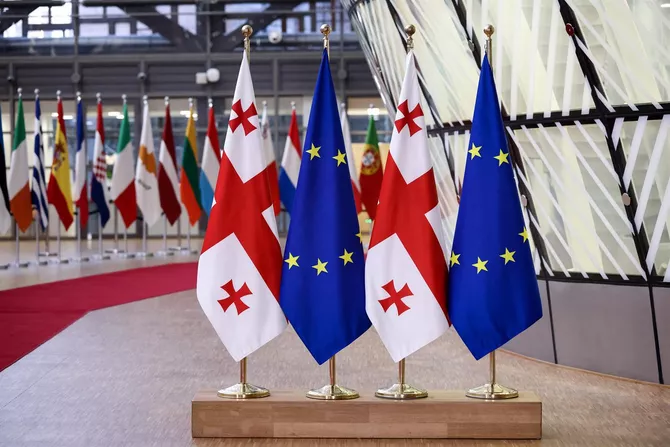
Photo credit: European Policy Centre
This is where resistance began. Many NGOs were used to working by their own templates, according to preapproved agendas, often dictating to ministries: “Here’s our project,” “we brought the money,” “we did the research - now you must act.” I insisted: no fragmentation - everything must fit into the unified system. This approach made them uncomfortable. And frankly, they didn’t rest until I was gone. It wasn’t a clash of personalities - it was a clash of philosophies: who runs the system - the state or the donor?
And this issue wasn’t limited to agriculture. Similar patterns are visible in education, regional development, transparency frameworks, and beyond. This has been going on for over two decades and remains largely unchecked. That’s why it’s so important for society to support Georgian Dream in its efforts to bring order to this area.
This isn’t about bans or repression. It’s about research, public education, and analytics. Society must understand: how the NGO sector works, who funds it, whom it serves, and what real benefits or threats it poses to development. Already, the parliamentary commission has uncovered serious violations - and that’s just the tip of the iceberg, involving people who manipulate civil society institutions in pursuit of political power.
In my recent speeches, I’ve emphasized: it’s not enough to talk - we must show, investigate, audit, analyze financial flows. Only then can we dismantle myths and explain to society who is who.
People are beginning to understand that no one gives money to Georgia for free. Every grant and program has specific interests behind it - and often, those interests do not align with our national ones. So, if Georgian Dream follows through with consistency and transparency, it will earn broad public support.
Yes, public opinion is mixed. Some support the law, some don’t. But even that can be measured - we can see where the weak spots are, which age groups are vulnerable, which are being manipulated. That’s the path to true democracy - not fighting society, but persuading it with facts.
And if this path is pursued to the end, I have no doubt that the majority will stand on the side of truth.
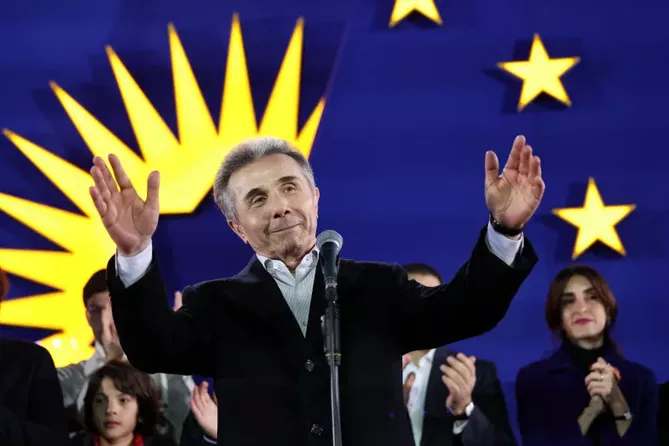
Georgian billionaire and founder of the ruling Georgian Dream party Bidzina Ivanishvili speaks to supporters in Tbilisi [Giorgi Arjevanidze/AFP]
- Who today has the moral authority to define what freedom means: foreign actors or the electorate that chose Georgian Dream?
- When we talk about democracy, we must ask the central question: is freedom the will of the people or a script written by external forces?
For three decades, Georgia has lived in a space where high-level decisions are often accompanied by strong foreign influence. The arrival of Shevardnadze, and later Saakashvili, are striking examples. No one hid the fact that the latter was “a Western project,” and society saw him as a symbol of hope for a post-Soviet future. People believed that with him would come a new system - a new life.
I myself was part of the 2003 transition and became an “acceptable figure” for the new authorities, continuing my work as head of the Marneuli municipality. Power shifted rapidly, the old system was almost completely dismantled. Initially, everything looked promising: anti-corruption measures, reforms, economic revitalization. But soon, we saw the other side of this transformation - repression, pressure on business, lawlessness.
The so-called “projector democracy” quickly morphed into authoritarianism. A machine was set in motion: businessmen were imprisoned, property was confiscated, universities handed over to relatives of officials. One MP even called it “state banditry” - and that was no exaggeration. The West made a grave mistake back then, turning a blind eye and mistaking loyalty for democracy.
Today, we are paying the price for that blindness. There is deep distrust - toward former leaders and their foreign backers alike. Yet everyone understands the importance of strategic ties with the U.S. and EU. The ruling party is trying to chart a balanced course - staying aligned with the West without severing ties with neighbors. Georgia cannot afford to be a country with one friend and many enemies.
Georgian Dream remains in power not because it is flawless - but because it offers at least some form of stability. Yet the country needs a new wave of reforms, a new economic strategy, and fresh ideas. The key is to assess reality soberly, not just through statistics, and to remember: democracy is not an export product - it’s a conscious choice by the people. And that choice must come from within, not be imposed from outside.
Share on social media